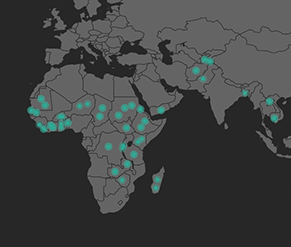Education challenges still vast
The legacy of civil war combined with the cumulative effects of years of conflict, political instability and extreme poverty, eroded earlier gains in access to education.
At least 2.2 million South Sudanese children were estimated to be out of school in 2018. The vast majority of these children are girls, child soldiers, children with disabilities, and children who are just too hungry, too busy working to help their families, or too afraid of the journey to school.
South Sudan’s population is among the youngest in the world - which puts an additional strain on the already stretched education system, characterized by weak and under-resourced national systems.
School life expectancy in South Sudan is among the lowest in the world - on average, a child can expect to receive a total of five years of education.
There is also a shortage of textbooks: 3 students share one textbook for both English and math - far from the policy of 1 textbook per student.
GPE stood by South Sudan in times of crisis
South Sudan has been a GPE partner country since 2012. However, outbreaks of conflict in 2013 and 2016 hampered the implementation of the General Education Sector Strategy covering the period 2012-2017. The GPE-funded program had to stop operating for a while before the program could be restructured to address the needs emerging from the conflict.
In 2015, GPE gave South Sudan a grant to support the development of the GESP which responds to the challenges identified in the education analysis. Aptly subtitled "Planning for Safety, Resilience and Social Cohesion", the new plan envisions to bring out-of-school children into schools, harmonize teacher training courses, introduce a new curriculum and a set of textbooks aligned to the curriculum.
Several partners were involved in developing the GESP including humanitarian actors, NGOs and civil society organizations, along with teachers and a few ministries.
This inclusive process – spearheaded by GPE - contributed to building a common vision for the education sector while promoting a coordinated sector dialogue and a better planning process.
Bridging the gap between humanitarian needs and development
GPE allocated an implementation grant of US$36.1 million to South Sudan for 2013-2018 to fund activities outlined in the education plan. While the program was conceptualized when South Sudan was relatively peaceful, it was implemented in an extremely challenging context characterized by the outbreak of the civil war and the protracted conflict that followed.

